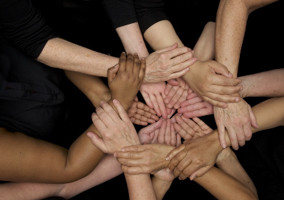Every once in a while something crops up that pushes you to speak out. Whether it’s about your mood at the time or the actual event being something no one should ignore you end up speaking out. Such a thing happened to me this week.
I have been avoiding adding my voice publicly on the issue of funding to BAME-led charities and ensuring funds go to people from a BAME heritage. I have supported the multiplicity of other voices; you would have had to try hard to miss the Runnymede Trust Colour of Money report last month, or the Ubele Initiative survey report Impact of COVID-19 on BAME community and voluntary organisations, and if you’re on Twitter you will have seen the regular posts from CharitySoWhite.
All speak of the systemic, structural racism starkly exposed by the Covid-19 crisis and the disproportionate impact on people of colour.
Instead, I have been annoying within the systems, wherever I can. I have tried to ensure people are connected to each in an attempt to get things moving now and address the crisis. All is with the hope that we have a moment of evolution, with a bit of revolution (see actors above), that will make a lasting change for BAME communities and BAME-led charities.
What one tweet says about attitudes and behaviours
So what pushed me over my personal edge? A tweet. Ah, you say, that happens every day. I don’t bite on most but this one opened my eyes that we are not evolving and revolution is being resisted.
The tweet from a charity CEO (older people) and trustee (disability) using a story from the Independent about a pensioner backing the legal action against the ill-judged “do not resuscitate” messages sent to older people and disabled people. It was illustrated by a photo an older white woman. The tweet stated that no one cares as the pensioner is not from a BAME heritage – that we would have been outraged if this message had been sent to a person from a BAME heritage.
I was, and am, outraged at the suggestion. It sent me a message that the author, and probably others, feel that the story should move on from BAME communities, as if we’ve had our 15 minutes and should shut up now.
It concerned me that the charity CEO and trustee does not recognise the intersectionality of age and/or disability with race. Do those charities treat people of colour differently to their white service users, or are people of colour actually not welcome, however subtly?
Chronic underfunding
I am outraged that the historic chronic underfunding of BAME-led charities will see so many of them close. I am already hearing from trustees where they feel they have no choice but to close (not unique to BAME-led organisations but I am hearing more of those stories at the moment).
I am outraged that funders of all types, with a few notable exceptions, have not invested in BAME infrastructure or BAME-led organisations. Now that it is needed everyone is scrambling to try and undo 10 years of disinvestment and expecting organisations stretched beyond capacity to move quickly and present the solutions.
I am outraged that there is even a push-back on the idea of ringfencing 20% of funds to BAME-led organisations and people. I support the CharitySoWhite call for the ringfence not just because this horrid virus is affecting people of colour more but because a ringfence that just meet local, regional or even national percentages of the population does not address that chronic, long term disinvestment.
Mainstream organisations don’t reach everyone
That programme of disinvestment started with a mainstreaming agenda well over a decade ago. It affected BAME-led, women-led, LGBTQI and disability organisations. Can you see a theme here?
We know mainstream organisations do work with people with protected characteristics but the approach, the offer and the reach just doesn’t reach everyone.
The programmes rarely reach the numbers of people to match the local demographic. People choose to go where they feel supported and where they trust. The disinvestment to BAME organisations was writ large when the 2010 coalition government decided that V4CE should no longer be treated as a strategic partner, essentially pulling away funding and access to influence.
At the start of the Covid-19 crisis V4CE and ACEVO were due to the launch their racism in the sector report, following almost two years of research. I saw some of the early findings and when we all see the full report I hope you are outraged too.
Elizabeth Balgobin is an experienced charity interim manager and trustee. She is also regular columnist for Governance & Leadership magazine
Related articles












